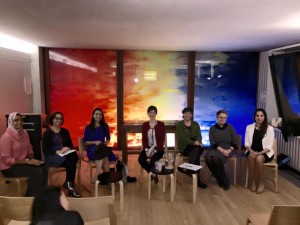Janis Wong, President of LSE Women Leaders of Tomorrow Society, offers her views on the Women’s Interfaith Panel discussion about Religion and Female Leadership, hosted by the LSE Faith Centre as part of Interfaith Week.

Last week, as part of LSESU Interfaith Week, the LSESU Jewish Society, in association with LSESU Women Leaders of Tomorrow Society, organised a Women’s Interfaith Panel. Exploring what gender and faith meant to them, the speakers provided a great amount of insight not only in regards to their personal relationship with faith, but also how their beliefs provide the foundation to the work which they do.
From an academic perspective, Lindsay Simmonds, a graduate of the LSJS Susi Bradfield Women Educators’ Fellowships and PhD candidate at the LSE, discussed her work with the Cambridge Co-Exist Leadership Programme. Having explored a wide range of religions during her upbringing, much of her work today focuses on promoting respectful, deep and long-lasting friendship and collegiality between religious leaders, regardless of their faith community. Starting from the bottom-up, Lindsay emphasised the importance of education to encourage acceptance and understanding the ever-evolving meaning of individual faiths.
Within her own religious community, Cannon Mandy Ford described the challenges she faced regarding her role in Church. Despite having priesthood, there continues to be individuals who do not believe that she has authority to act as the leader and perform ordinances. Moreover, Navpreet Atwal, an associate solicitor and ambassador for City Sikhs, explains her struggles within smaller communities to challenge the status quo. Whilst historically, Gurus have emphasised their support for gender equality beyond the context of religion, Navpreet illustrated that the message has become lost over the years. As a result of continuing pressure and expectations from society, women become entangled between the dichotomy of following traditional religious values and embracing feminism. Society often considers the two to be incompatible. However, our speakers, through looking at Red Lips Project question of ‘What makes you feel powerful?’, have identified through different means that the two categories are not mutually exclusive.
From a historic perspective, Fabiana Barticioti, an Assistant Archivist on the LSE Archives and Special Collections team, discussed her work on the publication of the Movement for Ordination of Women Archive (6MOW). Beyond the common perception of the Suffragette Movement as the main symbol of liberation, Fabiana guided us through her work and discoveries. The 6MOW Archive will be publicly accessible in 2016. Furthermore, Nava Ashraf, an Associate Professor at Harvard Business School, joining the LSE next academic year, shared her experiences practicing the Bahá’i faith. In addition to her research in behavioural economics in the context of global development, she shares her faith’s teachings which accept the full spiritual and social equality of women to men. As a fundamental principle, gender equality extends past correcting historical, socio-economic injustices, and encourages the pursuit of education and social opportunities. Despite our panelists practicing different religions, it is clear that education plays a key role in challenging the culturally institutionalised social constructs which destabilise gender equality.
Drawing from her own experiences at LSE and sharing with us her perspective on the importance of Intersectional Feminism, Sana Musharraf, a postgraduate at LSE, fights against all odds and underlines the importance of faith in her life. Explaining her exploration of different religions, she describes her journey of self-discovery and how her beliefs gave her the drive and strength she needed to work to her successes today.
In light of recent events, the LSE Women’s Interfaith Panel was an inspiring session, prompting us to explore the meaning of faith for ourselves. As society’s values change, it is crucial that we disband pre-existing religious stereotypes and seek interpretations of religion which better reflect the multi-cultural, pluralist communities we live in.
Read more about the Movement for Ordination of Women Archive at LSE Archives and Special Collections here!


